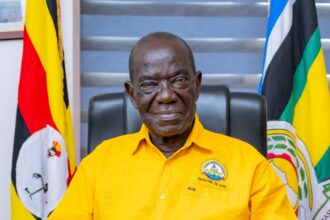By Denis Jjuuko
On Thursday this week, Jennifer Musisi, the Kampala Capital City Authority (KCCA) executive director accused the traffic police of turning themselves into traffic lights at several of the city’s intersections. The police responded by saying that there aren’t enough traffic lights in the city and therefore if they don’t intervene, the city would halt to a gridlock. It is alleged that Friday’s traffic jam in the city was a result of traffic cops staying off the street to prove a point to the exuberant chief executive.
Unless you have just started living in Kampala, the city’s traffic problems are not caused by the lack of cops on the streets. Friday’s traffic jam in as much as it was very heavy, wasn’t the first time Kampala came to a standstill. In fact the whole of this week and like anytime towards Christmas, there has been crazy traffic jams. Ugandans from abroad (the so-called Summers) and upcountry, traders from all over the country and neighboring countries and those chasing end of year dreams all come to Kampala as the country has only one city which is also the commercial capital.
Almost every year for the last 10 years or so, every few days to Christmas, there is unbelievable traffic. Occasionally, traffic builds up in Kampala even on ordinary days just like it was on Friday. On all these days, there are traffic cops everywhere. There is going to be a lot of traffic jam in Kampala this year until December 23. If you live in Kampala, you also know that every December 31, there is unbelievable heavy traffic in Kampala. And that is one day when Police deploys both its traffic and other men and women the most.
Kampala’s traffic problems are caused by many issues the city is currently facing. The major one is lack of an efficient public transport system. The major public transport system is dominated by 14-seat minibuses and boda bodas. The rest of the population either walks to the city or drives personal cars. A small percentage uses the train for a few kilometres. Those who walk to the city don’t cause many traffic problems.
Because of an inefficient public transport system, whoever can afford an Ex-Japanese car (they are called end-of-life vehicles in the automotive industry) gets one. It is a dream for most people to buy a car in Kampala. And these cars on average transport a maximum of two people to the city everyday. These cars are parked for the rest of the day as people go about their work. And those who can afford two cars, buy them. So it is not uncommon to find a wife and husband who work a few blocks from each other each driving to work every day. That also explains why you can find many cars parked at a bar with hardly anyone inside. Because we all drive to wherever instead of sharing.
If our public transport system was efficient, the majority of people wouldn’t be driving to the city. At least I wouldn’t. One bus that carries 62 passengers can eliminate 31 or even 62 cars off Kampala streets! And another bus of same specifications would get 4.4 minibuses (taxis in Uganda) off the street. How do we get taxi owners to move into buying buses instead? Most taxi owners have several of them so they can easily get buses without any significant additional investment. Supporting the local automotive industry is something the government must think about so we can make buses here as they would be cheaper than those made elsewhere.
The train that moves from Kampala to around Namboole is always full of people. Imagine if that train circled Kampala by going all the way to Kyengera on the Kampala-Masaka Road, Bulenga on Mityana Road, Nansana/Wakiso on Hoima Road, Kawempe/Matugga on Bombo Road, Gayaza and then to Seeta on Jinja Road before connecting to Namboole. With several stages for people to hop on and off, Kampala traffic would be history. Another train route would start in Kampala and connect to Entebbe Airport with several stops along the way. Actually, the Entebbe Expressway wouldn’t be necessary with that kind of an efficient electric train. At least not necessary in the immediate term.
The other reason for Kampala’s traffic jams is the expansion of the city. I know somebody who lives 11km from the city along Entebbe Road. About 17 years ago when he started living there, he would leave office at 5.00pm, drive home and be at Fairway Hotel for the 5.30pm gym workout session. Today, if he tries to go home at 5.00pm, he will reach past the 9.00pm prime news. Entebbe, the country’s major gateway to the world has become a hard to reach area. I think NGOs now pay an allowance to their staff to go to Entebbe like they do whenever their people travel to risky areas. Entebbe is less than 40km from Kampala.
The majority of people who work in Kampala used to live within a 5km radius about 25 years ago. Today, the majority of people live within a 15-20km radius. Without an efficient public transport system, they have to buy themselves vehicles, which today are clogging the city.
Let us not forget that in the last 25 years or so, Kampala’s roads have not be significantly improved. The only major addition to Kampala’s roads in this period is the Northern Bypass (a friend once called it a Bypath), which is a single lane unlit road with traffic jam creating roundabouts everywhere. In fact, this road hasn’t even been completed in almost 15 years since construction started. And it is just 21km. I stopped using this road sometime back. Somebody said the Indians who built the Uganda Railway at the turn of the 20th century delivered it in about four years with half their staff eaten by lions in the Tsavo National Park. Mombasa is 1200km from Kampala. The railway extended to Kasese in the west of the country and covered some part of northern Uganda. In the 21st century, we cannot complete a 21km road on time.
The feeder roads to the city are unpaved and therefore people tend to avoid them. Look at Entebbe Road, there are many roads joining it off Masaka Road, but if you are driving from that side, you may have to drive to Busega and then Kibuye. I am not sure the Nnebalamyemayanja Road has been completed. The Kira-Matugga Road can decongest Bwayise and Kawempe but it remains a dirty road most people avoid. Without a network of roads around greater Kampala to decongest the city, the traffic cops who turned themselves from villains to heroes yesterday will never solve the city’s traffic woes and will be villains soon.
The other issue is the way we drive in Kampala. We are inconsiderate to fellow road users. Everyone wants to behave as a star on the road showing off their latest 16-year old. We create lanes where there should be none. Boda bodas have been allowed to break the traffic rules with reckless abandon. It is only in Kampala where you look left, right, and then left several times before crossing a one-way street. Boda bodas drive from all sorts of directions. They jump traffic lights with traffic cops smiling at them. In fact sometimes, the cops create more traffic jams than clearing them.
Unless Kampala creates an effective efficient public transport system, the city’s traffic nightmare is just about to begin regardless of whether cops are on the road or not. Maybe just get used to it or create an out of the box business to solve the problem.
Do you have a story in your community or an opinion to share with us: Email us at Submit an Article






